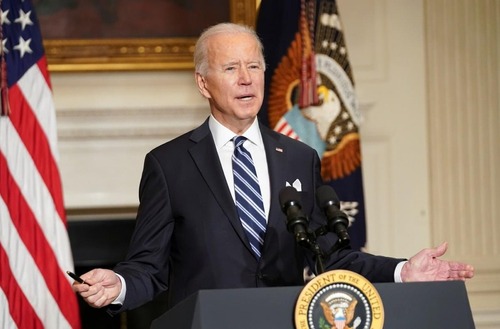
The Centers for Disease Control and Prevention (CDC), the federal government’s nerve center for its COVID-19 pandemic response, would receive an additional $1.6 billion in funding over last year’s approved levels under President Joe Biden’s mammoth $1.5 trillion federal spending plan for fiscal year 2022.
“The Administration is working aggressively to respond to the current COVID-19 pandemic and is committed to rebuilding and expanding defenses to prevent, detect, and respond to emerging and future biological threats,” the White House said on Friday.
Biden on April 9 requested that Congress approve the proposed trillion-dollar-plus discretionary spending plan, which would authorize the CDC funds as part of the $131.7 billion the president seeks for the U.S. Health and Human Services Department (HHS).
“COVID-19 shed light on how health inequities and lack of federal funding left communities vulnerable to crises,” HHS Secretary Xavier Becerra said on Friday. “The president’s funding request invests in America, addresses racial disparities in health care, tackles the opioid crisis, and puts us on a better footing to take on the next public health crisis.”
Specifically, the Biden plan requests $8.7 billion for the CDC to improve public health capacity in states and territories, an increase of $1.6 billion over 2021 enacted levels, according to HHS, which said the additional funds would enhance the agency’s ability to deploy experts internationally and build worldwide capacity to detect and respond to emerging global health threats.
“This would be the largest annual budget authority increase for CDC in nearly 20 years and is needed to restore capacity to the world’s preeminent public health agency,” HHS said on Friday. “Building on the investments in the American Rescue Plan, CDC will use additional funding to support core public health capacity improvements, modernize public health data, and train a cadre of epidemiologists and other public health experts who can deploy and support public health efforts.”
The White House sent an April 9 letter to U.S. Sen. Patrick Leahy (D-VT), chairman of the Senate Appropriations Committee, pointing out that over the past decade, due in large measure to overly restrictive budget caps, the nation has significantly underinvested in core public services, benefits, and protections.
The U.S. Office of Management and Budget (OMB) noted in the 58-page letter that since FY 2010, non-defense discretionary funding — the area of the federal budget that funds public health, education, research, and other crucial services — has shrunk significantly as a share of the economy.
“The consequences of this broad disinvestment are plain to see,” OMB wrote. “We know that anticipating, preparing for, and fighting a global pandemic requires a robust public health infrastructure. Yet, going into the COVID-19 pandemic, funding for the Centers for Disease Control and Prevention was 10 percent lower than a decade ago, adjusted for inflation.”
OMB wrote that Biden’s funding request would modernize many aspects of public health in America “by proposing investments to build a healthier, more resilient Nation over the long term, including funding to ensure the Nation is better positioned to prevent and respond to future public health crises, help defeat other diseases and epidemics, and invest in cutting-edge medical research.”
For instance, as part of the overall HHS funding request, Biden proposes $905 million be authorized for the Office of the Assistant Secretary for Preparedness and Response’s Strategic National Stockpile (SNS) to maintain replenishment of critical medical supplies and restructuring efforts initiated during the COVID-19 pandemic.
“The Administration would ensure SNS investments position the Nation to respond to the most likely chemical, biological, radiological, and nuclear threats as opposed to simply restocking expired materiel,” OMB wrote.
HHS added that Biden’s proposed investments reflect the major discretionary elements of his broader agenda within HHS, and during the coming months, “the Administration will release the President’s Budget, which will present a unified, comprehensive plan to address the overlapping crises we face in a fiscally and economically responsible way.”




